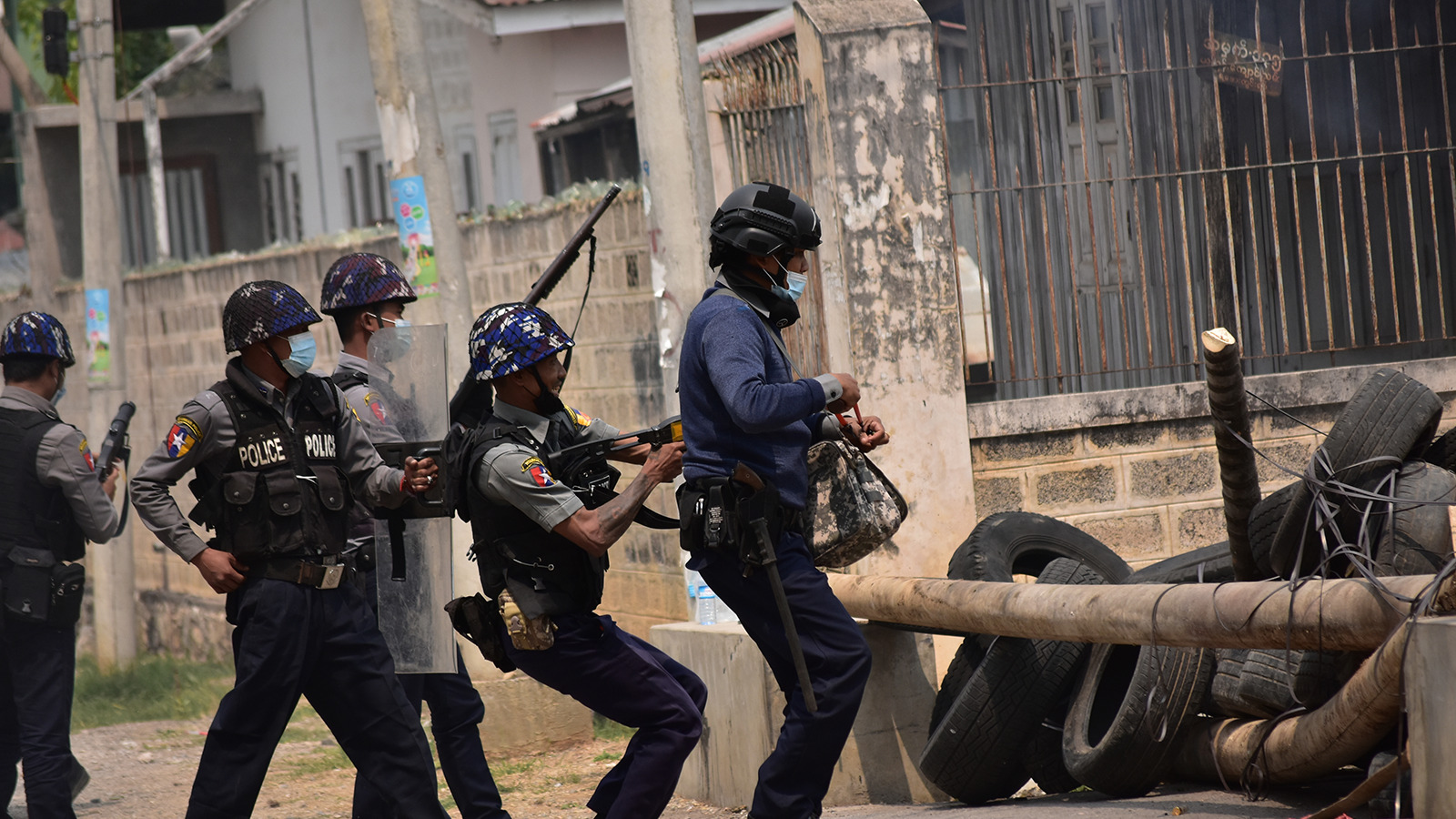Nearly a year after the Myanmar military seized power in a coup, the U.S. government issued a new advisory warning about the heightened risks associated with doing business in the country.
The document cited the military’s involvement in human-rights abuses since taking control and warned about its facilitation of corruption, highlighting areas of the economy controlled by the junta and compiling the restrictions imposed on figures and entities associated with the coup.
“Businesses and individuals with potential exposure to, or involvement in operations or supply chains tied to, the military regime that do not conduct appropriate due diligence run the risk of engaging in conduct that may expose them to significant reputational, financial and legal risks, including violations of U.S. anti-money laundering laws and sanctions,” the advisory said.
The advisory comes as major global energy firms, including Australia’s Woodside Petroleum, France’s TotalEnergies SE and Chevron Corp., announced plans to leave Myanmar. The United Nations Security Council is expected to hold a meeting about the ongoing crisis.
Since the coup on Feb. 1, 2021, the U.S. and their allies have sanctioned many top Myanmar military leaders and members of their families, as well as state-owned enterprises and the State Administrative Council, the military’s governing body. The U.S. also added Myanmar to its list of countries that face restrictions on exports to military end users or for military end use (MEU).
Major entities and sectors of concern within Myanmar include state-owned enterprises; gems and precious metals; real estate and construction projects; and arms, military equipment and related activity, the advisory said. Myanmar also faces significant illicit finance risks and gaps in its anti-money laundering and counter-terrorist financing framework (AML/CFT), it warned.
Myanmar military-controlled state-owned enterprises play a dominant role in their respective sectors of the economy, generating about half of the junta’s revenue and its spending budget, according to the advisory. Many of the enterprises are also accused of corruption, using child and forced labor, surveillance and other human and labor rights abuses, the advisory said.
Several of the largest Myanmar state-owned enterprises have been sanctioned, including Myanma Gems Enterprise (MGE), Myanma Timber Enterprise (MTE) and Myanmar Pearl Enterprise (MPE). Myanma Oil and Gas Enterprise (MOGE), however, is not designated, nor are three state mining entities named in the advisory.
Companies that bought teak from MTE since the coup have subsequently sold and shipped goods to U.S. firms, according to trade data reviewed by Kharon. A pearl farm that has worked with MPE is majority owned by an Australian firm and its director, Kharon found.
A large portion of the gems and precious metals sector in Myanmar is controlled by the military through two holding companies, Myanma Economic Holdings Limited (MEHL) and Myanmar Economic Corporation (MEC), and their numerous subsidiaries, the advisory said, citing findings from a U.N. report. Both MEHL and MEC are sanctioned by the U.S. and their allies, and they are subject to export restrictions imposed by the U.S. Department of Commerce.
Gem, pearl and precious metal importers are recommended by the U.S. government to use enhanced due diligence to understand their supply chains and ensure they’re not sourcing from, or brokering through, Myanmar military-owned or operated entities, the advisory said. “A supply chain that, on paper, does not refer to or otherwise appear to touch Burma may still involve links in which the military is the ultimate beneficiary,” the advisory said, using Myanmar’s other name.
Myanmar’s military also has significant interests in the real estate sector as an owner, lessor and seller of property within the country, according to the advisory.
Foreign companies may be paying the military for rent through MEHL and MEC, the advisory said, citing U.N. findings. U.S. companies with a physical presence in the country should investigate whether payments are benefiting sanctioned entities, and should take appropriate measures to ensure compliance with sanctions and money laundering controls, it said.
MEHL operates at least three industrial zones, one of which rents space to companies that had shipped goods that arrived in the U.S. weeks after the coup, Kharon reported in March 2021. Multiple foreign companies have a presence at the Pyinmabin Industrial Zone in Yangon, Kharon found. The zone was cited by name in the advisory and is owned by MEHL, according to the U.N.
Golden Land Real Estate Development Co., Ltd. leased land from the Myanmar Quartermaster General Office, a defense procurement agency sanctioned in December by U.S., U.K. and Canada to coincide with International Human Rights Day, according to records seen by Kharon.
Arms trafficking, already a problem in Myanmar, has worsened since the coup, the advisory said. The U.N. adopted a resolution in June 2021 calling for a stop to the flow of arms and the U.S. encouraged businesses and individuals to implement screening procedures to stop the facilitation of trade with the Myanmar arms and defense sectors, the advisory noted.
Nevertheless, entities in a number of countries have sold weapons or other military equipment to Myanmar, including firms in China, India, Israel, Japan, North Korea, Russia and others, according to the advisory.
India-based Bharat Electronics Limited sold more than USD 28.3 million worth of radar systems, multipurpose reflex weapons and other goods to the Myanmar Ministry of Defense Directorate of Procurement between July 2019 and July 2021, according to trade records. The directorate was also sanctioned in December for human rights abuses.
“The international business community has a responsibility to ensure it is not contributing to corruption, illicit financial activity or serious human rights abuses, all now heightened since the coup,” said Brian E. Nelson, Treasury undersecretary for terrorism and financial intelligence.
The document cited the military’s involvement in human-rights abuses since taking control and warned about its facilitation of corruption, highlighting areas of the economy controlled by the junta and compiling the restrictions imposed on figures and entities associated with the coup.
“Businesses and individuals with potential exposure to, or involvement in operations or supply chains tied to, the military regime that do not conduct appropriate due diligence run the risk of engaging in conduct that may expose them to significant reputational, financial and legal risks, including violations of U.S. anti-money laundering laws and sanctions,” the advisory said.
The advisory comes as major global energy firms, including Australia’s Woodside Petroleum, France’s TotalEnergies SE and Chevron Corp., announced plans to leave Myanmar. The United Nations Security Council is expected to hold a meeting about the ongoing crisis.
Since the coup on Feb. 1, 2021, the U.S. and their allies have sanctioned many top Myanmar military leaders and members of their families, as well as state-owned enterprises and the State Administrative Council, the military’s governing body. The U.S. also added Myanmar to its list of countries that face restrictions on exports to military end users or for military end use (MEU).
Major entities and sectors of concern within Myanmar include state-owned enterprises; gems and precious metals; real estate and construction projects; and arms, military equipment and related activity, the advisory said. Myanmar also faces significant illicit finance risks and gaps in its anti-money laundering and counter-terrorist financing framework (AML/CFT), it warned.
Myanmar military-controlled state-owned enterprises play a dominant role in their respective sectors of the economy, generating about half of the junta’s revenue and its spending budget, according to the advisory. Many of the enterprises are also accused of corruption, using child and forced labor, surveillance and other human and labor rights abuses, the advisory said.
Several of the largest Myanmar state-owned enterprises have been sanctioned, including Myanma Gems Enterprise (MGE), Myanma Timber Enterprise (MTE) and Myanmar Pearl Enterprise (MPE). Myanma Oil and Gas Enterprise (MOGE), however, is not designated, nor are three state mining entities named in the advisory.
Companies that bought teak from MTE since the coup have subsequently sold and shipped goods to U.S. firms, according to trade data reviewed by Kharon. A pearl farm that has worked with MPE is majority owned by an Australian firm and its director, Kharon found.
A large portion of the gems and precious metals sector in Myanmar is controlled by the military through two holding companies, Myanma Economic Holdings Limited (MEHL) and Myanmar Economic Corporation (MEC), and their numerous subsidiaries, the advisory said, citing findings from a U.N. report. Both MEHL and MEC are sanctioned by the U.S. and their allies, and they are subject to export restrictions imposed by the U.S. Department of Commerce.
Gem, pearl and precious metal importers are recommended by the U.S. government to use enhanced due diligence to understand their supply chains and ensure they’re not sourcing from, or brokering through, Myanmar military-owned or operated entities, the advisory said. “A supply chain that, on paper, does not refer to or otherwise appear to touch Burma may still involve links in which the military is the ultimate beneficiary,” the advisory said, using Myanmar’s other name.
Myanmar’s military also has significant interests in the real estate sector as an owner, lessor and seller of property within the country, according to the advisory.
Foreign companies may be paying the military for rent through MEHL and MEC, the advisory said, citing U.N. findings. U.S. companies with a physical presence in the country should investigate whether payments are benefiting sanctioned entities, and should take appropriate measures to ensure compliance with sanctions and money laundering controls, it said.
MEHL operates at least three industrial zones, one of which rents space to companies that had shipped goods that arrived in the U.S. weeks after the coup, Kharon reported in March 2021. Multiple foreign companies have a presence at the Pyinmabin Industrial Zone in Yangon, Kharon found. The zone was cited by name in the advisory and is owned by MEHL, according to the U.N.
Golden Land Real Estate Development Co., Ltd. leased land from the Myanmar Quartermaster General Office, a defense procurement agency sanctioned in December by U.S., U.K. and Canada to coincide with International Human Rights Day, according to records seen by Kharon.
Arms trafficking, already a problem in Myanmar, has worsened since the coup, the advisory said. The U.N. adopted a resolution in June 2021 calling for a stop to the flow of arms and the U.S. encouraged businesses and individuals to implement screening procedures to stop the facilitation of trade with the Myanmar arms and defense sectors, the advisory noted.
Nevertheless, entities in a number of countries have sold weapons or other military equipment to Myanmar, including firms in China, India, Israel, Japan, North Korea, Russia and others, according to the advisory.
India-based Bharat Electronics Limited sold more than USD 28.3 million worth of radar systems, multipurpose reflex weapons and other goods to the Myanmar Ministry of Defense Directorate of Procurement between July 2019 and July 2021, according to trade records. The directorate was also sanctioned in December for human rights abuses.
“The international business community has a responsibility to ensure it is not contributing to corruption, illicit financial activity or serious human rights abuses, all now heightened since the coup,” said Brian E. Nelson, Treasury undersecretary for terrorism and financial intelligence.




